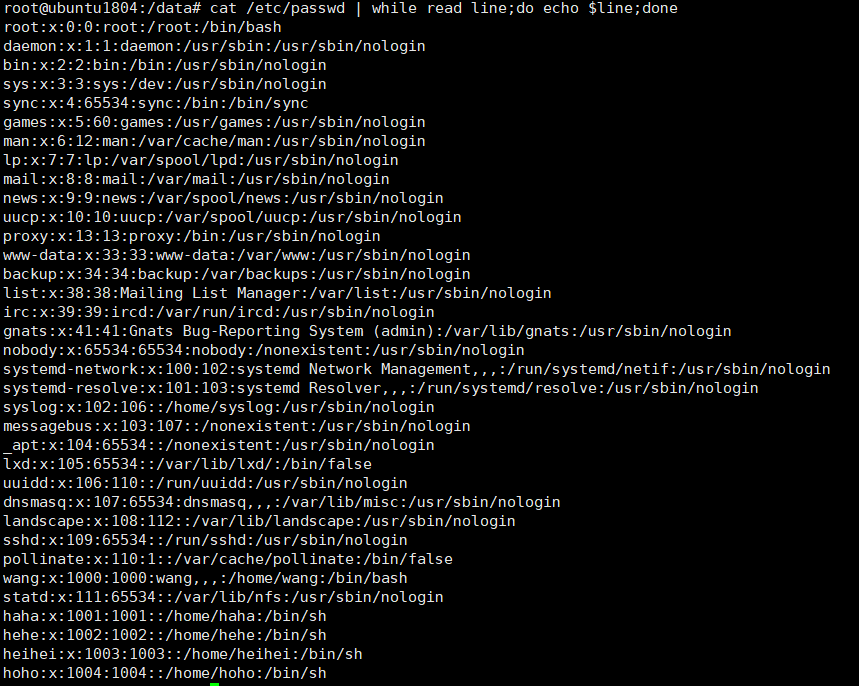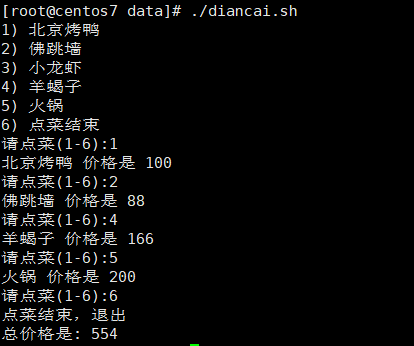shell脚本进阶shift和select
1.shift:解决参数过多问题,将参数装进一个列表,每shift一下,就将列表整体前移,shift默认为1.
范例:用shift批量创建用户
#!/bin/bash if [ $# -eq 0 ];then echo "Usage: `basename $0` user1 user2 ..." exit fi while [ "$1" ];do if id $1 &> /dev/null;then echo $1 is exist else useradd $1 echo "$1 is created" fi shift done echo "all user is created"



2.while read
读入一行,逐行处理
例:读入一行,输出一行
root@ubuntu1804:/data# while read line; do echo $line;done

例:读入并打印到文件中
root@ubuntu1804:/data# while read line;do echo $line >> /root/test.org;done

例:标准输入重定向实现逐行处理
root@ubuntu1804:/data# while read line;do echo $line;done << /etc/issue
例:用管道实现逐行处理
root@ubuntu1804:/data# cat /etc/passwd | while read line;do echo $line;done

例:1)显示df设备名及占有率
root@ubuntu1804:/data# df |sed -nr "/\/dev\/sd/s/^([^ ]+) .* ([0-9]+)%.*/\1 \2/p"

2)逐行处理并发邮件
while true;do df |sed -nr "/\/dev\/sd/s/^([^ ]+) .* ([0-9]+)%.*/\1 \2/p" | while read DEV USE;do [ $USE -gt 80 ] && echo "$DEV will be full,use:$USE" | mail -s "warning" 925724962@qq.com;done sleep 1 done
例:考试成绩逐行处理
#!/bin/bash cat score.txt | tr ':' ' ' | while read name score;do if [ $score -gt 90 ];then echo $name is excellent else echo $name is low fi done

3.1)注意:管道符”|“前后会开启子进程
例子:读入变量输出
[root@centos7 data]# echo weilan | read X;echo $X

发现什么都没有输出,要想将变量X输出,则需将管道后的命令放在一个进程里,用”{}“
[root@centos7 data]# echo weilan | { read X;echo $X ; } weilan
当然小括号”()“也可以:
[root@centos7 data]# echo weilan | (read X;echo $X) weilan
2)我们再重述大括号”{}“和”()“的区别,小括号”()“是对一串命令重新开一个子进程进行执行。大括号”{}“是在当前进程执行:
()和{}内的命令都是以”;“隔开;
()最后一个命令可以不用分号;
{}最后一个命令需要分号;
()第一个命令不需要和括号间有空格;
{}第一个命令和左边的括号间有空格。
4.select:帮我们生成菜单
1)查看select用法.
[root@centos7 data]# help select select: select NAME [in WORDS ... ;] do COMMANDS; done Select words from a list and execute commands. The WORDS are expanded, generating a list of words. The set of expanded words is printed on the standard error, each preceded by a number. If `in WORDS' is not present, `in "$@"' is assumed. The PS3 prompt is then displayed and a line read from the standard input. If the line consists of the number corresponding to one of the displayed words, then NAME is set to that word. If the line is empty, WORDS and the prompt are redisplayed. If EOF is read, the command completes. Any other value read causes NAME to be set to null. The line read is saved in the variable REPLY. COMMANDS are executed after each selection until a break command is executed. Exit Status: Returns the status of the last command executed.
例子:随意创建一个菜单:
[root@centos7 data]# select menu in 备份数据库 清理日志 升级软件 降级软件 删库跑路;do echo $REPLY;done

2)增加菜单提示:PS3="xxx"
[root@centos7 data]# PS3=" 请选择功能(1-5): ";select menu in 备份数据库 清理日志 升级软件 降级软件 删库跑路;do echo $REPLY;done

例子:点菜菜单
1 2 3 4 5 6 7 8 9 10 11 12 13 14 15 16 17 18 19 20 21 22 23 24 25 26 27 28 29 30 31 32 33 34 35 | #!/bin/bashsum=0PS3="请点菜(1-6):"select MENU in 北京烤鸭 佛跳墙 小龙虾 羊蝎子 火锅 点菜结束;docase $REPLY in1) echo $MENU 价格是 100 let sum+=100 ;;2) echo $MENU 价格是 88 let sum+=88 ;;3) echo $MENU 价格是 66 let sum+=66 ;;4) echo $MENU 价格是 166 let sum+=166 ;;5) echo $MENU 价格是 200 let sum+=200 ;;6) echo "点菜结束,退出" break ;;*) echo "点菜结束,重新选择" ;;esacdoneecho "总价格是: $sum" |

记录于2022/3/4-23:08





【推荐】国内首个AI IDE,深度理解中文开发场景,立即下载体验Trae
【推荐】编程新体验,更懂你的AI,立即体验豆包MarsCode编程助手
【推荐】抖音旗下AI助手豆包,你的智能百科全书,全免费不限次数
【推荐】轻量又高性能的 SSH 工具 IShell:AI 加持,快人一步
· 分享一个免费、快速、无限量使用的满血 DeepSeek R1 模型,支持深度思考和联网搜索!
· 基于 Docker 搭建 FRP 内网穿透开源项目(很简单哒)
· ollama系列01:轻松3步本地部署deepseek,普通电脑可用
· 按钮权限的设计及实现
· 25岁的心里话